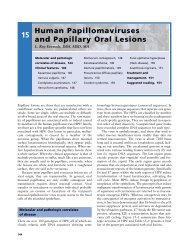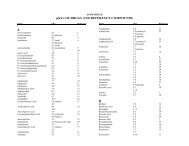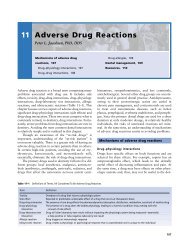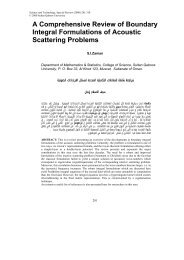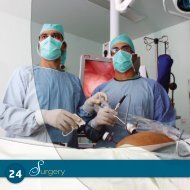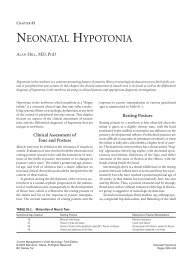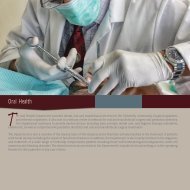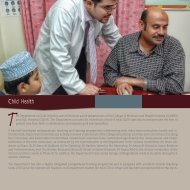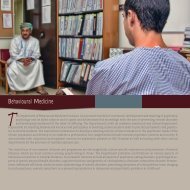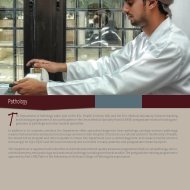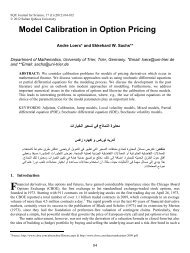3.Behavioural Medicine.pdf - Sultan Qaboos University
3.Behavioural Medicine.pdf - Sultan Qaboos University
3.Behavioural Medicine.pdf - Sultan Qaboos University
Create successful ePaper yourself
Turn your PDF publications into a flip-book with our unique Google optimized e-Paper software.
OverviewThe Department of Behavioural <strong>Medicine</strong>’s mission is to promote excellence in the research,development and teaching of psychiatry and its allied subjects and to apply and disseminate thisknowledge with the aim of preventing mental disorders and developing treatment for the relief ofsuffering. The Department is both an academic and clinical department, responsible for teachingbehavioural sciences to pre-clinical students and psychiatry to clinical students. The Department’spolicy is to make learning as far as possible student-centred. Accordingly, the lectures, seminarsand tutorials for pre-clinical students are of an interactive nature, designed to encourage participationin the form of problem-based learning. The Department endeavours to develop a learningculture of direct relevance to the situation in Oman and develop in its students the right attitudetowards patients and society. It also provides both outpatient and inpatient services for psychiatricpatients in SQU Hospital as well as liaising with other clinical departments for the provision ofBmultidisciplinary care. The main focus of our research interests and programme are the magnitude,culture-specific expressions and prevention of mental illnesses, which are most common amongpeople living in Oman. The Department publishes contributions on various aspects of behaviouralmedicine in medical literature. Our research interests include all aspects of psychiatry, eating disorders,psychological aspects of specific physical disorders, cognitive functions of schizophrenic patients,genetics of schizophrenia, obsessive-compulsive disorder, bereavement, deliberate self-harm,alcoholism, epidemiology of mental disorders, presenting symptoms of schizophrenia, brain imagingin acute psychosis, somatic symptoms as a presenting symptoms in depression and psychiatric problemsin childhood.Dept.03a c a d e m i c an d pa t i e n t ca r e de p a r t m e n t sBehavioural <strong>Medicine</strong>StaffHead of DepartmentZiad A J Zaidan, Associate ProfessorFacultyAla’Aldin Al-Hussaini, ProfessorPage39
Marwan Sharbati, Associate ProfessorSamir Al-Adawi, Associate ProfessorHarith Ghassany, Assistant ProfessorRodger Martin, Senior ConsultantAmre El Guenedi, Senior RegistrarNonna Viernes, RegistrarAziz Al-Naamani, RegistrarYousef Obeid, RegistrarAmal Ambusaidi, Senior House OfficerAmira Al-Hosni, Senior House OfficerIbrahim Elzein, Senior House OfficerSupport StaffSamira Al-Hamdan, PsychologistSalwa Al-Redha, PsychologistAbdullah Al-Sulaimani, Social WorkerAhmed Al-Salmi, Social WorkerKhamis Al-Balushi, Social WorkerKhawala Al-Wahaibi, Social WorkerYounis Al-Hashim, Social WorkerRavindran Kozhapatil, CoordinatorGovindan Mundayadan, CoordinatorBPage40Highlights of the Year 2007-2008The year 2007-2008 witnessed an enormous growth and expansion of the Department. The psychiatricresidency programme was implemented in conjunction with the Oman Medical SpecialtyBoard (OMSB). In line with changes in medical education, the Department participated with otherdepartments in the College in running the clinical communication skills course as well as liaising withother departments in interdisciplinary activities.
The Department was involved in local and international research collaborations and published anumber of papers on various aspects of behavioural medicine, psychiatry, psychology and alliedfields, for example: cross-cultural differences in morbid body preference; hazardous and harmingdrinking patterns in Oman; medical education and child psychiatry. In the departmental database,much research has been amassed on topics such as how distress is experienced in Oman; psychologicalaspects of specific physical disorders; cognitive functions of schizophrenic patients; geneticsof schizophrenia and obsessive-compulsive disorders and adjustment difficulties and developmentaldisorders among infants, children and adolescents.Teaching ProgrammesBCourseBehavioural Sciences IBehavioural Sciences IIClinical Attachment in PsychiatrySemesterSpring/SummerFall/SummerRotation of 8 weeksThe number of students for each of the departmental courses was approximately 120.The Department participates with other departments in the College in running the clinical communicationskills course. The number of students was approximately 140.Undergraduate Preclinical ProgrammeThe Department’s policy is to make learning student-centred as far as possible. Accordingly, thelectures, seminars and tutorials for pre-clinical students are of an interactive nature, designed toencourage participation in the form of problem-based learning. The Department conducts threeinter-related courses of Behavioural Sciences. The first course focuses on socio-cultural studiesrelevant to medicine. The second concentrates on factors associated with individual differences,developmental milestones and the third course introduces applied behavioural medicine as relevantfor the doctor-patient relationship and clinical communication and cultural specific idiomof distress.Dept.03a c a d e m i c an d pa t i e n t ca r e de p a r t m e n t sBehavioural <strong>Medicine</strong>Page41
13000110009000700050003000Outpatients1000200699072007 20081132512013Inpatients308B278Figure: Statistics Psychiatry In & Outpatients Clinic (2006-2008)Undergraduate Clinical ProgrammeThe interactive, student-centred approach of the Department is adopted even more strongly forteaching clinical students. During the rotation, our medical students are encouraged to develop skillsin interviewing patients and their families, interpreting diagnostic tests, planning multidisciplinarytreatment, making behavioural interventions, and administering pharmacological treatment as wellas acquiring skill in using psychotherapeutic modalities. Students are also encouraged to participateactively in clinical case presentations of common psychiatric problems.242Page42The main thrust of psychiatry teaching is to equip future Omani doctors with the ability to prevent,diagnose and treat various mental illnesses in the community at large and to expose our studentsto empirical evidence that distress, disease and treatment are experienced in the context of culturaland social processes. The academic component includes a regular seminar in therapeutic skillsof teaching and consultation, teaching on current issues in psychiatry, developmental psychology,psychological assessments, personality, bereavement, cross-cultural psychiatry, eclectic approachesto psychological intervention, and behavioural medicine. To keep abreast with the development of
psychiatry elsewhere, a regular ‘Journal-Club’ is held. External speakers are also part and parcelof this endeavour.Postgraduate ProgrammeThe Department continued to train Family and Community <strong>Medicine</strong> residents and contributedto revising programmes for the examination for Membership of the Royal College of GeneralPractitioners (MRCGP), the Arab Board of Psychiatry and the Oman Medical Specialty Board(OMSB) residency training programme including writing the curriculum, preparing for exams andwriting their programmes.Training Courses & CME ActivitiesBThe Department conducted a number of workshops on various aspects of stress and coping, researchmethodology and issues pertinent to social medicine.Clinical & Diagnostic ServicesOn the hospital side, the combination of referrals from all part of Oman and prompt service deliveryput the Department in the vanguard of psychiatric services in the country. The Department is oneof the few departments nationally which provide for specialist tertiary referrals. It has a multidisciplinaryteam approach designed for optimum treatment of patients and training of medical students.The Department has a support staff of psychologists, nurses, social workers and other clinicians.Dept.03a c a d e m i c an d pa t i e n t ca r e de p a r t m e n t sBehavioural <strong>Medicine</strong>A wide range of assessments and treatments using various conceptual models including IQ, personalitytesting, neuropsychiatry, cognitive behaviour and psychotherapy are offered. It also offerscomprehensive liaison psychiatry with other branches of medicine as well as psychosocial interventionand various social work services.The Department offers unique Clinical & Diagnostic Services. The assessments provided by ourstaff employ specialised testing procedures to integrate medical, neurological, and behaviouralPage43
data with neuropsychological test findings to answer any of a number of referral questions. Referralsto our services typically consist of, but are not limited to, questions concerning (a) differentialdiagnoses between psychogenic and neurogenic syndromes (e.g. depression versus dementia), (b)delineation of spared and impaired cognitive functions secondary to central nervous system dysfunction,(c) establishment of behavioural baseline measures to monitor recovery or progression ofcentral nervous system dysfunction (d) comparison of pre- and post-pharmacological states, surgical,and behavioural interventions (e) assessment of cognitive/behavioural functions for the formulationof rehabilitation, management strategies, and/or educational or employment placement and (f)evaluation of neurocognitive status for the purpose of tests for disability, compensation and liabilitydeterminations in forensic cases.BThe attitudes of adolescents and young adults in Omani second and third-cycle students tomobile phonesResearchResearch ProjectsProject Code:CR/SCI/Math/08/01Dates: 2006-2009Value: OR 12,700Project Funder:Investigators:<strong>Sultan</strong> <strong>Qaboos</strong> <strong>University</strong>Dr. Samir Al-Adawi, Department of Behavioural <strong>Medicine</strong>, SQU;Professor Atsu Dorvlo, Department of Mathematic and Statistics, SQU;Dr. Charles Asante, Language Centre, SQU.Page44A Survey of Oman’s ‘Tomorrow doctors’ interests in Psychiatry at <strong>Sultan</strong> <strong>Qaboos</strong> <strong>University</strong>Project Code: MREC #272
Dates: 2007-2008Value:Investigator:UnfundedBProject Code: MREC #282Dr. Samir Al-Adawi, Department of Behavioural <strong>Medicine</strong>, SQU.Prevalence of Anxiety & Depression among Patients with Epilepsy at a Tertiary Care Hospitalin OmanProject Code: MREC #278Dates: 2008-2009Value:Investigators:UnfundedDr. Samir Al-Adawi, Department of Behavioural <strong>Medicine</strong>, SQU; Dr.Abdullah Al-Asmi, Department of <strong>Medicine</strong>, SQU.Determining the Culturally Specific Symptom Constellation of Posttraumatic Stress Disorderamong OmanisDates: 2008-2009Value:Investigators:UnfundedDr. Samir Al-Adawi, Department of Behavioural <strong>Medicine</strong>, SQU; Dr.Liyam Eloul, Fulbright Scholar, Standford <strong>University</strong>, USA & SQUResearch Publications and BooksJournal Publications1. Al-Adawi S, Al-Naamani A, Dorvlo ASS, Bhaya C, Martin RG, Al-Hussaini, A Al-Guenedi A. Witheringbefore the Sowing? A Survey of Oman’s ‘Tomorrow’s Doctors’ Interest in Psychiatry. Education for Health2008; 21:117.2. Al-Sinawi H, Al-Adawi S, Al-Guenedi A. Ramadan Fasting Triggering Koro-like Symptoms during AcuteAlcohol Withdrawal: A Case Report from Oman. Transcult Psych 2008; 45:695-704.Dept.03a c a d e m i c an d pa t i e n t ca r e de p a r t m e n t sBehavioural <strong>Medicine</strong>Page45
3. Al-Shafaee MA, Al-Shukaili S, Rizvi SGA, Al-Farsi Y, Khan MA, Ganguly SS, Afifi, M, Al-Adawi S. Knowledgeand perceptions of diabetes in a semi-urban Omani population. BMC Public Health 2008, 8:249 doi:10.1186/1471-2458-8-249.4. Al-Mandhari A, Al-Adawi S, Al-Zakwani I, Al-Shafaee M, Eloul L. Impact of Geographical Proximity onHealth Care Seeking behavior in Northern Oman. SQU Med J 2008; 8:310-18.5. Al-Sharbati M, Al-Adawi S, Ganguly S, Al-Lawatiya S, Al-Mshefri F. Hyperactivity in a Sample of OmaniSchoolboys. J Atten Disord 2008; 12:264-9.6. Kayano M, Yoshiuchi K, Al-Adawi S, Viernes N, Dorvlo AS, Kumano H, Kuboki T, Akabayashi A. Eating attitudesand body dissatisfaction in adolescents: Cross-cultural study. Psych and Clin Neurosci 2008; 62:17-25.7. Jain NB, Al-Adawi S, Dorvlo AS, Burke DT. Association between body mass index and functional independencemeasure in patients with deconditioning. Am J of Phy Med & Rehab 2008; 87:21-25.8. Seif Eldin A, Habib D, Noufal A, Farrag S, Bazaid K, Al-Sharbati M, Badr H, Moussa S, Essali A, GaddourN. Use of M-CHAT for a multinational screening Bof young children with autism in the Arab countries. Int RevPsych 2008; 20:281-9.9. Al-Adawi S, Al-Naamani A, Dorvlo A, Lad SD, Al-Maashani A, Sharma RR, Gorman D. Open methylphenidatetrial among brain injured population in Oman with acute vs. chronic working memory impairment. BrainInjury 2008; 22:144.10. Al-Naamani A, Al-Adawi S, Dorvlo A, Lad SD, Al-Maashani A, Sharma RR, Gorman D. Fatigue and affectivefunctioning in cross-cultural survivors of traumatic brain Injury. Brain Injury 2008; 22:174-5.11. Al-Adawi S, Dorvlo Al-Naamani A, Lad SD, Al-Maashani A, Sharma RR, Gorman D. Disorder of selfneglectin brain injured population in Oman: incidence, neuropsychology and psychopharmacology. Brain Injury2008; 22:24-2.Page46Conference & Seminar PresentationsCONFERENCE PRESENTATIONSInternational1. Al-Adawi S. Disorder of self-neglect in brain injured population in Oman: incidence, neuropsychology and psychopharmacology.The Seventh World Congress on Brain injury of the International Brain Injury Association inconjunction with the Portuguese Society of Physical Rehabilitation <strong>Medicine</strong>. Lisbon, Portugal, 10 April 2008.2. Al-Sharbati et al. Hyperactivity in a sample of Omani schoolboys. 3rd World Conference of the International IraqiMedical Association-online. Sharjah, UAE, 20-22 March 2008.3. Al-Sharbati M. ADHD in the Arab World. The future of ADHD in the Arab World. Manama, Bahrain, 27
March 2008.4. Al-Sharbati M. Child and Adolescent Psychiatry in Oman. Pan Arab Congress. Cairo, Egypt, 18-20 June2008.Dept.03Ba c a d e m i c an d pa t i e n t ca r e de p a r t m e n t sBehavioural <strong>Medicine</strong>Page47



